

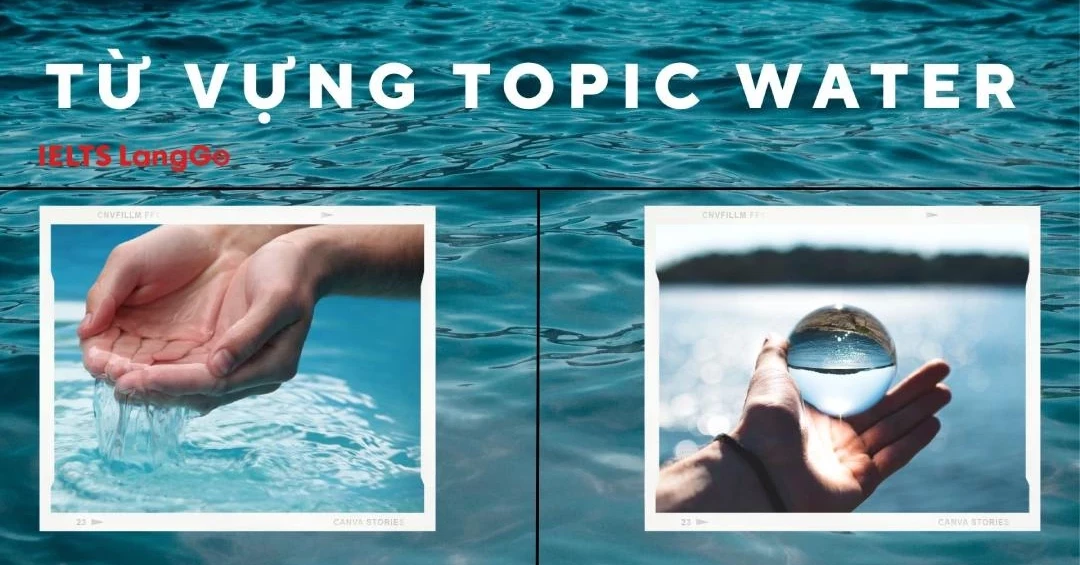
Water là chủ đề xuất hiện thường xuyên trong đề thi IELTS Writing task 2. Hôm nay IELTS LangGo sẽ chia sẻ với bạn bộ từ vựng topic Water cực hay cùng một vài sample Writing về chủ đề này. Bắt đầu “nạp” từ mới IELTS ngay thôi!
Nhắc đến chủ đề Nước là chúng ta đã có thể liệt kê được rất nhiều những từ vựng quen thuộc như freshwater, bottled water, faucet, … Tuy nhiên, để thực sự chinh phục được IELTS Writing task 2 bạn cần nắm chắc các từ vựng topic Water chất lượng dưới đây.
Ví dụ: It’s necessary for the government to use water resources efficiently. (Chính phủ cần sử dụng tài nguyên nước một cách hiệu quả.)
Ví dụ: It’s estimated that agriculture takes 70% of global freshwater use. (Theo tính toán, nông nghiệp chiếm đến 70% nước sạch sử dụng toàn cầu.)
Ví dụ: Countries should give affordable access to fresh water, not free water. (Các quốc gia nên cho phép nước ngọt tiếp cận với giá cả phải chăng chứ không phải nước miễn phí.)
Ví dụ: Distilled water is often used in chemistry lab. (Nước cất thường được sử dụng trong phòng thí nghiệm hóa học.)
Ví dụ: Purified water is used in marine aquariums. (Nước tinh khiết được sử dụng trong thủy cung.)
Ví dụ: There are chemicals in tap water that are detrimental to human’s health. (Có những chất hóa học trong nước máy gây nguy hại đến sức khỏe con người.)
Ví dụ: In the summer, many stores run short on bottled water. (Vào mùa hè, nhiều cửa hàng thiếu nước đóng chai.)
Ví dụ: The highly polluted river has adverse effects on the groundwater. (Con sông bị ô nhiễm nặng đã ảnh hưởng xấu đến mạch nước ngầm.)
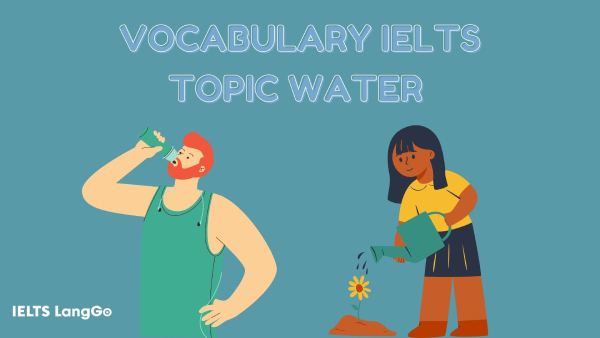
Tổng hợp từ vựng topic about water thường xuất hiện trong IELTS
Ví dụ: Saltwater fish have a shorter lifespan in the aquarium. (Cá nước mặn có tuổi thọ ngắn hơn trong bể nuôi.)
Ví dụ: Would you like a cup of mineral water with ice cubes? (Bạn có muốn một cốc nước khoáng với vài viên đá không?)
Ví dụ: Drinking ice water frequently can cause sore throat. (Uống nước đá thường xuyên có thể bị đau họng.)
Ví dụ: In many countries, people have to deal with a water scarcity, in which there is not enough fresh water for daily use. (Ở nhiều quốc gia, mọi người phải đối mặt với vấn đề thiếu hụt nước, bởi không có đủ nước sạch để sử dụng hàng ngày.)
Ví dụ: Due to the earthquake, the water supply has been cut off. (Do động đất, nguồn cung cấp nước đã bị cắt.)
Ví dụ: Water scarcity is less likely to be a problem if the government has efficient sewage systems. (Sự thiếu hụt nước sẽ không là vấn đề nếu chính phủ có những hệ thống xử lý nước thải hiệu quả.)
Ví dụ: In Nigeria, there is not enough drinkable water for everyone. (Ở Nigeria, không có đủ nước uống được cho mọi người.)
Ví dụ: Oil spillages make water no longer safe to drink. (Sự tràn dầu khiến cho nước không còn an toàn để uống.)
Ví dụ: In developing countries, water crisis is due to poor water management. (Ở những quốc gia đang phát triển, khủng hoảng về nước là do sự quản lý nước kém.)
Ví dụ: The government should encourage sustainable water management to deal with water shortage. (Để giải quyết vấn đề thiếu hụt nước, chính phủ nên thúc đẩy sự quản lý nước bền vững.)
Ví dụ: Water conservation is the responsibility of the government and individuals. (Bảo tồn nước là trách nhiệm của chính phủ và các cá nhân.)
Ví dụ: To avoid water shortage, people should install water saving devices. (Để tránh tình trạng thiếu hụt nước, mọi người nên lắp đặt các thiết bị tiết kiệm nước.)
Ví dụ: It is crucial to encourage more sustainable farming practices. (Điều thiết yếu là phải khuyến khích những phương pháp làm nông bền vững.)
Ví dụ: There are several ways to recycle rainwater. (Có rất nhiều cách để tái sử dụng nước mưa.)
Ví dụ: Drinking lots of water before and after doing exercises to avoid dehydration. (Uống nhiều nước trước và sau khi tập thể dục để tránh mất nước.)
Ví dụ: Don’t forget to turn the faucet off when you don’t use it anymore. (Đừng quên tắt vòi nước khi bạn không dùng nữa.)
Ví dụ: The local authority considered increasing the capacity of the reservoir. (Chính quyền địa phương cân nhắc việc tăng sức chứa của hồ chứa nước.)
Ví dụ: Farmers are facing ruin after three years of severe drought. (Nông dân đang phải đối mặt với cảnh điêu tàn sau 3 năm hạn hán nghiêm trọng.)
Ví dụ: He bought a waterproof camera. (Anh ấy đã mua một chiếc máy ảnh chống thấm nước.)
Ví dụ: Since the tornado, they haven’t had any running water. They’ve had to buy bottled water to drink. (Kể từ cơn lốc xoáy, họ không có nước sinh hoạt. Họ phải mua nước đóng chai để uống.)
Sự ô nhiễm nước (Water pollution) là chủ đề không thể không nhắc đến khi học từ vựng topic Water. Cùng xem có những cụm từ nào bạn có thể sử dụng để ăn trọn điểm IELTS Writing task 2 nhé!
Đề thi IELTS Writing task 2 có thể sẽ yêu cầu bạn trình bày những nguyên nhân gây ra ô nhiễm nước. Vậy nên đừng bỏ qua những từ vựng topic Water pollution sau đây:
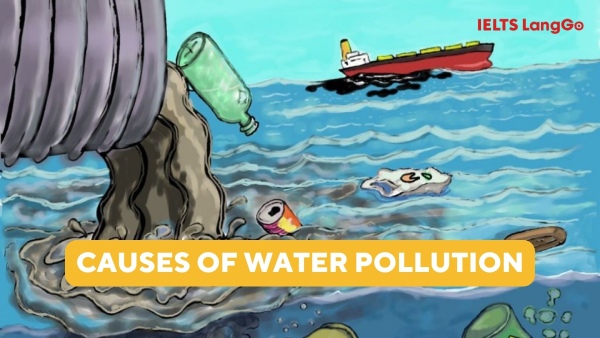
Từ vựng tiếng Anh về các nguyên nhân gây ra ô nhiễm nước
Nước bị ô nhiễm không chỉ gây nguy hiểm cho người uống mà còn ảnh hưởng đến cả những sinh vật sống dưới nước. Những từ vựng topic Water pollution dưới đây sẽ giúp bạn nói về những tác động của hiện tượng môi trường này.
Khi nói về các biện pháp giải quyết vấn đề ô nhiễm nước, bạn có thể tham khảo các cụm từ vựng topic Water sau:
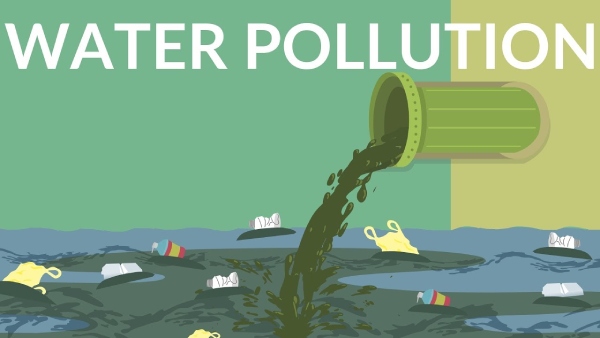
Từ vựng topic Water về cách bảo vệ môi trường nước
Chủ đề Nước không chỉ được “ưa chuộng” trong IELTS Writing task 2 mà nó còn có thể xuất hiện cả trong bài thi Speaking nữa đấy. Vậy thì còn chần chừ gì nữa mà không học ngay các từ vựng topic Water về idioms hay ho dưới đây.
Ví dụ: Andy will drop everything to support his brother, blood is thicker than water. (Andy sẽ từ bỏ mọi thứ để ủng hộ anh trai anh ấy, một giọt máu đào hơn ao nước lã mà.)
Ví dụ: She likes her old computer, but this new model blows it out of the water. (Cô ấy thích máy tính cũ của mình, nhưng mẫu mới này xịn hơn rất nhiều.)
Ví dụ: People often traveled to other countries by water in the 19th century. (Mọi người thường di chuyển đến các nước khác bằng đường thủy vào thế kỷ 19.)
Ví dụ: I want to see clear blue water between these two options. (Tôi muốn thấy sự khác biệt rõ ràng giữa 2 lựa chọn này.)
Ví dụ: Our project was dead in the water. (Dự án của chúng tôi đã thất bại.)
Ví dụ: Our company has so much debt that it is barely able to keep our heads above water. (Công ty chúng tôi mắc nợ nhiều đến nỗi mà hầu như không thể chi trả được.)
Ví dụ: She has taken to dancing like a duck to water. (Cô ấy học nhảy rất dễ dàng.)
Ví dụ: I can’t tell my daughter what she shouldn’t do, it's water off a duck's back with her. (Tôi không thể bảo con gái tôi nó không nên làm gì, nói với nó chẳng khác gì nước đổ đầu vịt.)
Ví dụ: She immediately threw cold water on his plans to buy a new car. (Cô ấy lập tức chỉ trích kế hoạch mua xe mới của anh ấy.)
Ví dụ: Whenever I say no to her requests, she turns on the waterworks. (Mỗi khi tôi nói không với yêu cầu của cô ấy, cô ấy lại bắt đầu khóc lóc.)
Ví dụ: I decided to tread water until my boss gives me a pay raise. (Tôi quyết định dậm chân tại chỗ cho đến khi sếp tôi tăng lương cho tôi.)
Ví dụ: We used to argue a lot but that’s water under the bridge. (Chúng ta từng cãi nhau rất nhiều nhưng đó đã là việc trong quá khứ rồi.)
Học từ vựng topic Water qua các bài viết mẫu Writing task 2 cũng là cách hiệu quả để bạn ghi nhớ từ dễ dàng hơn. Dưới đây là 2 bài mẫu chủ đề Water IELTS LangGo đã sưu tầm cùng danh sách các từ vựng topic Water bạn cần chú ý.
| Sample 1: Fresh water has always been a limited resource in some parts growing worldwide demand has made twice a global issue. What are the causes and what measures could government and individuals take to respond? |
It is undeniable that water scarcity is becoming a worldwide problem. The growth of the population is the main reason for this alarming trend, but some measures could be taken to tackle this predicament.
On the one hand, the pressure of the growing population on water resources could lead to a shortage of it. Increased population leads to increased water demand in three sectors namely agriculture, industry, and households. Firstly, from an agricultural perspective, irrigation consumes a large amount of water. Also, the agricultural industry could pollute the rest of the water with chemical compounds that are used in farming like pesticides. Secondly, industries and factories use a huge amount of water in their process. For instance, some research revealed that the meat processing industry could be the main cause of water shortage in some regions of the UK. Finally, water used for household purposes could be another consequence of population growth and ultimately could lead to water demand.
On the other hand, there are two main solutions to solve the problems described above. One solution is that water recycling could play an important role in water conservation. Governments should build new water pipes system for recycling and should encourage people to use recycled water. Another solution is to remove salts from seawater to enable people to use it. This process is called desalination. It is now used in many countries like the USA and achieved their goal.
In conclusion, water demand is a global problem caused mainly by the growth of the population, and governments and people should cooperate to solve this issue.
Nguồn: ieltsxpress
Từ vựng topic Water cần ghi nhớ:
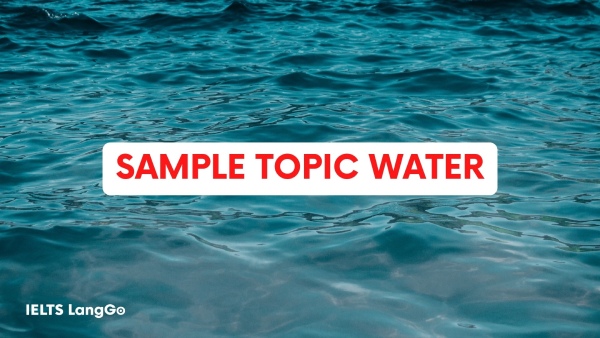
Sample Writing IELTS cùng list từ vựng topic Water
| Sample 2: Water pollution has been an increasing problem over the last few decades. What causes water pollution? How can we prevent this problem? |
One of the significant hazards that we face in this day and age is water pollution. Although there are numerous causes of water contamination, this predicament can be corrected with proper measures. In this essay, I will explore some of the sources of water pollution and suggest possible solutions to tackle the situation.
Today, the condition of water adulteration has reached such an extent that a considerable portion of the world population is suffering from the lack of fresh drinking water. There are also cases of deaths due to the deficiency of clean water in various underprivileged nations. The prime origins of infected water are factories and industrial undertakings. The discharge of hazardous contaminants into large water bodies taints the quality of the resource for everyone. Secondly, the unrestrained disposal of garbage and waste materials in rivers, lakes, and the sea is also a chief source of water degradation. Further, an accident such as oil spills in the water bodies makes its own contribution to this problem. Additionally, fertilizers and similar chemicals that are used to protect crops and plants or increase the yield sink in the soil to contaminate the groundwater level, which is later used for various purposes.
Nevertheless, such appalling circumstances can be mitigated by the efforts of the government and the general public. Stringent laws must be created and implemented to curb the soiling of water. Individuals who are caught discarding the trash into any water body must be heavily fined. Moreover, corporations and industrial manufacturers must be held accountable for their methods of disposal of toxic waste. Excessive use of chemicals in the fields should also be reduced and natural fertilizers should be taken up.
Finally, it is true that the damage that humanity has already done to the environment, especially to our natural water resources, is irreversible to a certain extent. However, it is our responsibility to take immediate action to impede further deterioration.
Nguồn tham khảo: ieltsmaterial
Từ vựng topic Water cần ghi nhớ:
Như vậy trong bài viết này IELTS LangGo đã tổng hợp list từ vựng topic Water cùng các bài mẫu Writing IELTS task 2 về chủ đề này. Hy vọng những kiến thức trên đây sẽ giúp bạn “nâng cấp” vốn từ vựng tiếng Anh hiệu quả.



ĐẶT LỊCH TƯ VẤN MIỄN PHÍ LỘ TRÌNH Săn ƯU ĐÃI lên tới 12.000.000đ